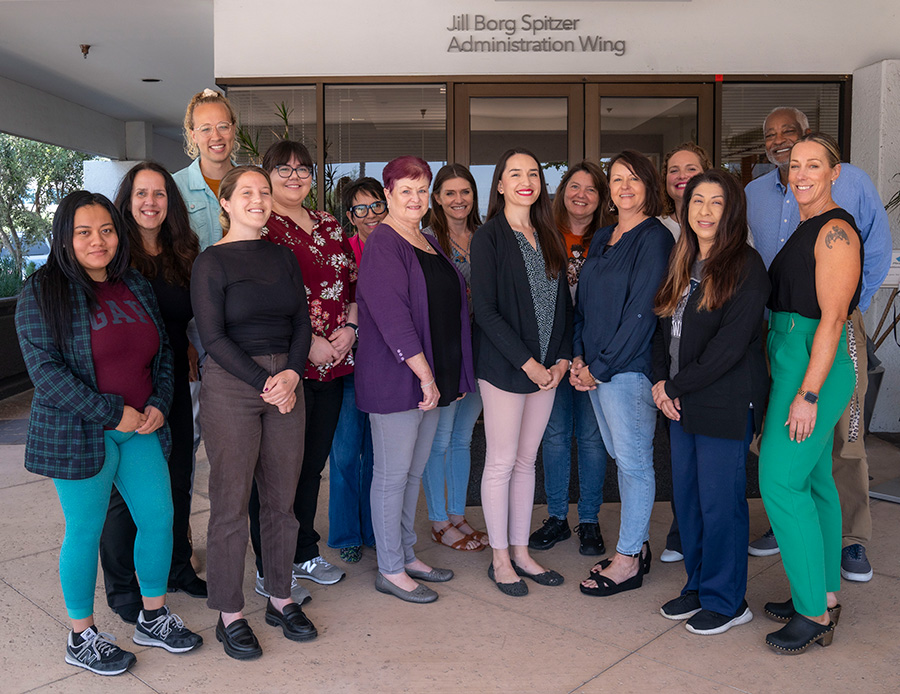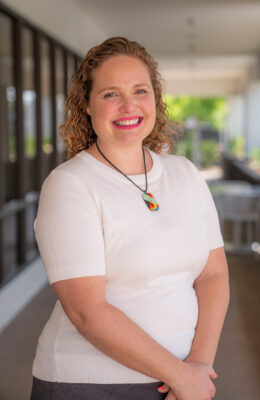Advocating for Change Starts with Empathy
Patient Advocacy at JFS
June 27, 2024

Since 2009, Jewish Family Service’s Patient Advocacy Team has been advocating for the often underserved, marginalized, stigmatized, and isolated community members who need someone they can count on in their corner. Their job is one that takes a great amount of skill—combining a knowledge of patients’ legal rights, trauma-informed care, and a healthy dose of compassion.
In this edition of our blog, Mike Phillips, JFS Senior Director of Patient Advocacy and Housing Services, and Melissa Hall, JFS Patient Advocacy Supervisor share more about these vital life-changing services and the impact they make in our community.
Patient Advocacy at JFS
The idea of patients’ rights first came to the forefront in the late 1960s during the civil rights movement, when the government decided to shut down many abusive warehouse-type mental health institutions. When the new law affecting involuntary detention went into effect in 1972, it was the University of San Diego Law School that oversaw Patient Advocacy until 2009 when JFS assumed the San Diego County’s contract under the helm of Mike Phillips.
“Patient Advocacy is about caring for people being marginalized because they have mental health issues—they are stigmatized, forgotten, dismissed, and locked up in facilities by people who care and want to help. As patient advocates, it is our job to reset the balance between the patient and the facility. We listen closely to the patient’s unique needs and ensure their rights are not violated while in a treatment facility. Often, it is the first time the patient feels seen and heard.”
With a team of nearly 20 Patient Advocates, our staff are cross-trained to jump in and help with any case if needed. Each team member focuses on a specific area—some are focused on licensed residential facilities for adults, some are focused on hospitals or skilled nursing facilities, and some are focused on substance use disorder treatment facilities. JFS Patient Advocacy facilitates and provides representation for clients at about 4,000 due process hearings per year and receives grievances from clients at nearly 400 different facilities throughout San Diego County. For clinical grievances, we work with independent consultant psychiatrists to determine if treatment is appropriate.
“I’m really impressed with the versatility of my team and the healthy environment at JFS that helps them be empowered. They have to go in and deal sometimes with very serious situations like suicide, severe mental health issues, and substance abuse and may see a child as young as three or an older adult that’s 103. The team has a great deal of empathy, and they comfort and support each other when days are tough knowing that I’m always there to back them up.”
On any given day, a member of the Patient Advocacy Team could be on the phone with a client or facility staff that have questions, attending a hearing, visiting a facility, conducting a training for facility staff or clients, representing JFS at a community event, or ensuring JFS’s information is given to every patient upon admittance. Regardless of the situation, our Patient Advocates are always working tirelessly to ensure the rights and dignity of all patients at behavioral health facilities in the County.
Sometimes It’s the Little Things That Matter
Mike went on to share one of his most memorable cases with us.
“I’ll never forget a case I had a while back with an older gentleman who was becoming aggressive with staff. The facility called me and asked for help, as there were no other placement options available. Initially, the client was not present or part of the conversation, so I insisted that he be allowed to join us. We then sat down with the gentleman and members of their staff to figure out if a solution could be reached.
Not really sure quite how to proceed, I asked the gentleman how things were going at the facility and if there was anything that he needed that he had not been getting. He paused to think about it, indicating to me that no one had been asking him this question. Much to everyone’s surprise, he replied: “The soap here is terrible.” “The soap?” I asked. He went on to explain, “I really like Irish Spring. I sure would love some Irish Spring.” I thought about it for a moment and then asked: “If we can get you some Irish Spring, do you think you can work on some of these dangerous behaviors?” He said that he would. So I said, “Okay,” and turned to ask the staff, “Would you give him some Irish Spring if he agrees to work on his aggressive behaviors?” And the staff said, “No.” So, I asked again, “If I go buy some Irish Spring, and he agrees to work on his aggressive behaviors, will you give it to him?” And they said, “Yes,” after much consideration. So, I got up from the table, went down to the 7-Eleven and purchased three packs of Irish Spring soap, came back, and gave them to the staff. The gentleman was at that facility for another nine months and there was not one incident ever again after that.
Not every case is as easy as Irish Spring, but it’s an important reminder that every client wants to be treated like a human being and does not want to feel like an animal in a cage. There’s a version of Irish Spring for everyone—it’s a symbol of ‘I’m still here, I’m alive, and I want to have a say in what’s happening to me.’ We have to appeal to people on a human level. We have to talk to them. Too many facilities don’t do that. They force medicine and treatment. So, it’s JFS who de-escalates the situation and brings the focus back to the individual. We change people’s lives in ways you can’t put on a spreadsheet.”
Advocating for Change Starts with Empathy
Advocating for change starts with empathy. It’s about changing what is to what should be and keeping patient’s rights and individual needs at the forefront. It’s about helping people move forward in an extremely difficult time in their lives. And it’s about educating and training caregivers and medical professionals in best practices and the law to create a more just and compassionate community.
“With a background in mental health and legal studies, I always loved the kind of work that’s fighting for the underdog and the underserved. As an empath, it can be one of the hardest jobs to take on, but I genuinely love doing it and the rest of the team does too. We have very low turnover, as our advocates stay with JFS for years because they can see the direct impact our services make in the community.
In our society today, there is still a lot of stigma around mental health, being homeless, and having a substance use disorder. Our Team facilitates nearly 200 trainings a year to help educate facility staff and clients, and ensure that patients’ rights are being upheld, plus respond to an average of 15,000 incoming and outgoing phone calls a month.
It can be easy to get overwhelmed with the number of cases on our desks, but as a Team, we all support each other—whether that’s sharing advice, coaching each other on how to be better allies, taking over a difficult phone call, or being a shoulder to cry on. We have team meetings every week and check in with each other daily. We are a Team that genuinely cares about our clients and each other and I think that’s one of the reasons we work so well together.”
The other reason our Patient Advocacy Team is so successful is because they have taken the time to build good relationships with facility staff members. When they advocate for positive changes that impact the patients, and protect patients’ rights, we know that these changes to policy are going to make a difference for everyone else who comes in for services from that point forward.
“It’s a good feeling knowing that our work can bring light and hope to so many who may be going through their darkest days.”









